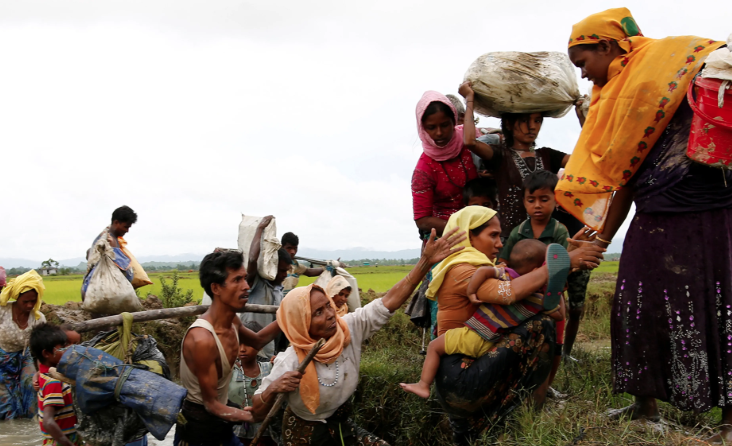Arakan Army Takes Full Control of Northern Rakhine
The Arakan Army, an armed group representing the Buddhist Rakhine ethnic community, has completely taken control of the northern part of Myanmar’s Rakhine state after capturing the Maungdaw outpost from Myanmar’s military, known as the Tatmadaw. This significant development has caused uncertainty along the 271-kilometer Bangladesh-Myanmar border.
With the Tatmadaw ousted, the Burmese side of the border is now entirely under the Arakan Army’s authority. The group’s victory in Maungdaw has strengthened its grip over Rakhine, an area where ethnic tensions and armed conflicts have long shaped daily life. For the Muslim Rohingya minority, who were previously denied basic rights and faced systematic repression under the Tatmadaw, the situation remains precarious.
The Arakan Army has previously expressed aspirations for autonomy in Rakhine state, a region where they are the majority. However, their stance on the Rohingya community has drawn criticism. The group has been accused of perpetuating hostility toward the Rohingya, who are still recovering from the violence of 2017, which forced over 740,000 people to flee to Bangladesh. Despite these allegations, the Arakan Army denies targeting the Rohingya population.
Implications for Bangladesh: Arakan Army Sparks New Challenges
For Bangladesh, the Arakan Army’s control over northern Rakhine poses new challenges. The country already shelters around one million Rohingya refugees in camps in Cox’s Bazar and nearby areas. This massive influx followed the brutal military crackdown by Myanmar’s forces in 2017. Now, with the change in control across the border, the risk of another wave of refugees looms large.
The stagnant discussions regarding Rohingya repatriation have also hit a roadblock. Earlier efforts to negotiate the return of the refugees involved Myanmar’s military government, but with the Tatmadaw losing its hold over northern Rakhine, such dialogues appear increasingly futile. As the Arakan Army asserts its dominance, Bangladesh faces the challenge of finding new avenues for negotiation.
However, opening dialogue with the Arakan Army is far from straightforward. As a non-state actor, the group lacks formal recognition, making any official discussions diplomatically complex. Additionally, the Arakan Army’s controversial stance toward the Rohingya community raises concerns about the safety and rights of those who may eventually return to their homeland.
Rising Tensions and New Risks for the Rohingya
The Arakan Army’s recent actions have heightened fears of renewed violence against the Rohingya. Reports indicate that following the battle for Maungdaw, the group detained both Myanmar army soldiers and members of Rohingya militias, including those from the Arakan Rohingya Army (ARA), Arakan Rohingya Salvation Army (ARSA), and Rohingya Solidarity Organization (RSO).
While some Rohingya may have assisted the Tatmadaw out of necessity or conscription, their involvement could spark new hostilities between the Arakan Army and the Rohingya. Observers have expressed concerns that the Arakan Army’s control over northern Rakhine may worsen the situation for the Rohingya, who already face immense hardships.
The Rohingyas in Bangladesh have little hope of returning to Rakhine under these circumstances. Despite occasional statements from the Arakan Army suggesting a willingness to coexist with the Rohingya, there is widespread skepticism. The group’s leadership has indicated support for the safe return of refugees, but actions on the ground have done little to inspire confidence.
The region’s history adds to the uncertainty. The Myanmar military once referred to its operations against the Rohingya as “unfinished business,” a term echoed in concerns that the Arakan Army may continue similar policies. Although the Arakan Army has hinted at coexistence, doubts remain about its true intentions.
The Role of Regional Interests
The complexities of the Rakhine situation extend beyond Bangladesh and Myanmar. Regional players such as India may have a role to play in shaping future developments. India has strategic interests in Rakhine due to its Kaladan project, which connects its northeastern states to Myanmar through the Rakhine state. Ensuring security in Rakhine is crucial for the success of this project, and India’s involvement could potentially open doors for dialogue between Bangladesh and the Arakan Army.
Bangladesh could leverage India’s influence to address the challenges posed by the new power dynamics in northern Rakhine. However, the path to effective negotiations remains fraught with difficulties. For now, the situation along the border continues to be marked by uncertainty and tension, with the fate of the Rohingya hanging in the balance.

